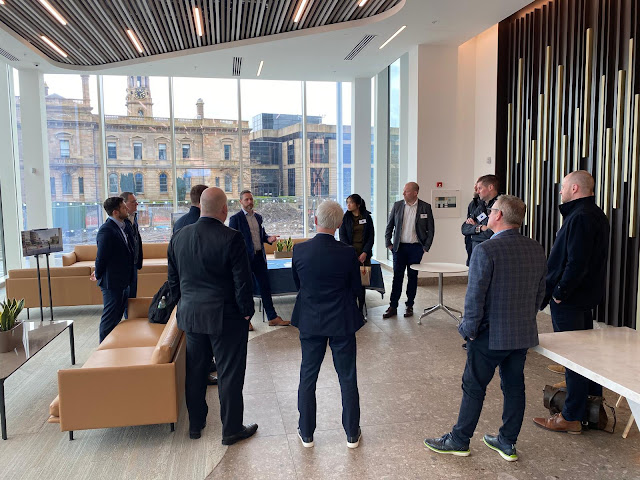Want staff back in the office? Think ‘Customer first’ and prioritise experiences
New British Council for Offices report tells employers and office designers to treat office workers like customers that need to be acquired and retained, and to find out what they want by means including experimentation and analysing metrics
A new British Council for Offices (BCO) report says staff must be treated like customers if employers want them back in the office. This means making the office a place that gives them the experiences they want.
Towards Experience Utopia provides the ultimate guide to creating ideal working environments that blend the best aspects of remote and in-office work. Commissioned by the BCO Occupiers Group, which comprises representatives of leading employers such as NatWest, PwC, Deloitte, Hines, Goldman Sachs, Gilead, BT and Citi, the ‘state of the nation’ report sets out the latest thinking on the implications of rise of hybrid working and the profound transformation in the office sector.
Just as consumer behaviour has changed in recent years, so too have the preferences of office workers. Expectations of what the office should offer are soaring, particularly from Gen Z, who value flexibility and work-life balance highly. The absolute focus for top employers should become designing and delivering enjoyable and inspiring places to work, as they compete with the comfort of home environments.
Previous BCO reports have implored building owners to treat their occupiers as customers to support revenue, retention, and reputation. This new research emphasises that this is no longer enough; the employee has become the ultimate arbiter of value, necessitating a paradigm shift in the design and operation of office buildings.
Metrics such as occupancy rates, badge swipes, meeting room use, and employee surveys can support in making data-driven decisions, in a similar way to how brands use insights on their customers to deliver personalised experiences and identify new opportunities.
The report provides practical guidance for occupiers, investors, developers, agents, architects and designers, engineers, technology experts, and property managers through strategies and checklists, as well as best practice case studies from the likes of Legal & General and the Government Property Agency.
The report makes the following recommendations:
- Develop customer experience strategies
A well-researched and effectively implemented strategy that prioritises employee satisfaction and wellbeing is key to meeting the diverse needs of today’s workforce. - Think consumer first
The value of offices as assets is ultimately determined by employees. Buildings that no longer attract people to the office will depreciate at speed. - Make data-driven decisions
Leverage insights into space utilisation, employee preferences and operational efficiency to continuously improve property development, product, and service design. - Lead cultural transformation
Invest in training to equip leaders with the skills to manage change and deliver exceptional customer experience, while promoting inclusivity and innovation. - Promote flexible leasing models
As well as allowing occupiers to optimise costs and resources, ready-fitted spaces that combine lease flexibility with location, design and amenities achieve premium margins. - Innovate and learn fast
Invest in research, product and service design. Experimentation will be key but prepare to fail and to share lessons learned. - Focus on operational excellence
Maintain efficient, sustainable buildings and provide top-tier amenities and services to attract high quality occupiers, improve brand reputation and asset performance. - Think ‘ESG as a service’
Rather than imposing targets and time-consuming requests for data, understand occupiers’ ESG goals and find ways to collaborate on mutual ambitions. - Redesign processes
How a workplace is experienced is shaped by thousands of interactions daily. Radically rethink property processes, especially those designed in another era.
Andy McBain, BCO Junior Vice President, Chair of the BCO Occupiers Group, and Head of Future of Workspace & Design at NatWest, said: “Employees must now be treated like customers, with their experience and satisfaction as the top priority if their loyalty to the office is to be earnt. Rising generations have different expectations of the workplace and combined with advancements in tech, this has brought about a tectonic shift in ways of working – and consequently how offices should be managed and serviced.”
Dr. Danielle Sanderson, Associate Professor of Real Estate at UCL and Senior Consultant at RealService, added: “For many of us, the office remains the central hub of our professional lives but today, the ability to work flexibly or remotely is not just a perk but an expectation. Hybrid working has challenged everything that we previously understood about the purpose of the office. Employers and workspace providers should be trying to ‘sell’ time in the office, gather insights into what their ‘customers’ want, and design customer journeys to deliver an excellent customer experience. Such a Customer Experience strategy offers real commercial benefits, as my research has repeatedly shown.”
This new research and the launch of the new BCO Customer Experience Award in early 2025 will foster debate about what the best practice looks like for different occupiers, drive improvements and recognise achievements in delivering brilliant customer experiences.
ENDS
Media contact
ING Media
BCO@ing-media.com
T: + 44 (0) 20 7247 8334
About the BCO
The British Council for Offices’ (BCO) mission is to research, develop and communicate best practice in all aspects of the office sector. It delivers this by providing a forum for the discussion and debate of relevant issues.
Established in 1990, the BCO is the UK’s leading forum for the discussion and debate of issues affecting the office sector.
Its members are all organisations involved in creating, acquiring, or occupying office space, whether architects, lawyers, surveyors, financial institutions, or public agencies. The BCO works to advance the collective understanding of its members, enabling them to work together to create more effective office space.








